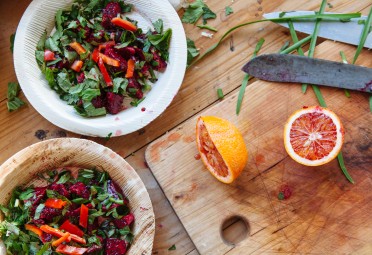I practice preventive and proactive medicine—I think it’s important to grab the bull by its horns and take control of your health, rather than sitting around waiting for problems to occur.
One of the best ways for you to do this is to pay attention to what you eat—food can be the safest form of medicine or the slowest form of poison—and one of the best ways you can determine how your body reacts to your food choices is how your skin looks.
Personally, I’m a huge believer in a plant-based diet, also known as veganism. I was raised vegetarian, but that meant eating dairy products and eggs. Once I went completely plant-based, I was surprised by all the extra benefits (beyond reducing the risks of cancer and cardiovascular disease!)—including, for me, glowing skin. What exactly is going on?
Contents
Your skin can benefit from a vegan diet in a number of ways.
A vegan diet tends to be high in fiber and lower in saturated fat than the average American diet. This allows for improved function of insulin and glucagon production, which control your sugar metabolism, a suspected cause of acne. (Insulin imbalance affects your skin’s sebaceous glands, which can lead to clogged pores, causing acne).
Plant-based diets are high in fruits and vegetables, which in turn are rich in antioxidants. I tell my patients to eat a rainbow of naturally colorful plants, like fresh tomatoes, roasted sweet potato, yellow bell peppers, baby spinach, blueberries, and beets: The more variety of natural colors available, the better. That way, you’re getting a big array of a variety of protective antioxidants.
Antioxidants can combat acne and reduce zit formation while promoting serious radiance and healthy glow to the skin. They scavenge free radicals and prevent damage to cells and tissues—the building blocks of your organs, including the skin. Antioxidants collectively decrease inflammation and help with collagen synthesis, which gives more elasticity to the skin and slows down the aging process.
Plant-based diets have also been associated with increased levels of vitamins and carotenoids, a.k.a. certain plant pigments (usually orange, red, and yellow). Fruits and vegetables with carotenoids produce beneficial skin color, which has been associated with glowing skin.
But what is it about dairy and meat that increases the risk for acne?
The standard American diet is notorious for its excess of calories, sugar, meat, and dairy. And there’s been evidence to suggest that this Western diet causes changes in protein signaling, which exacerbates oil and sebum production, thereby causing acne.
There’s evidence to suggest that growth hormones, such as those found in dairy milk, can contribute to acne. When humans consume dairy and meats, the growth hormones in these products interfere with several reactions at the cellular and enzyme levels, which disturb the normal functioning of gene expression.
Dairy has also been shown to have acne-promoting effects through other means; the insulin effects of milk and whey can be linked to acne formation.
And if you don’t want to go all-or-nothing vegan, that’s cool too.
There’s often a concern that plant-based diets are not sustainable, and that they’ll necessarily lead to vitamin and protein deficiencies. But if you do a good job triangulating your diet, nothing could be further from the truth. Deficiencies of protein, iron, calcium, and fatty acids are not as common as we think. But that doesn’t mean you have to go 100-percent vegan to reap some of the benefits of a plant-based diet.
I never expect all my patients to go completely vegan. It’s just not possible for a lot of people. Following a strict plant-based diet can offer up challenges—especially in social settings or in places where fresh fruit and vegetables are hard to come by.
But if you can follow the 80:20 or 90:10 rule, significantly reducing your consumption of animal products, then that’s a start. I think once my patients experience how amazing they look and feel, whether they discover beautiful skin, weight loss, or better sleep, they often figure out what’s best for them. Why not give veganism a try—your skin will likely thank you for it.
[“Source-greatist”]


